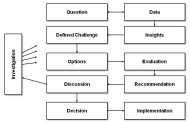 Your intuition is better than your rational mind at spotting liars. Unfortunately, for most other decisions, it’s not so good. For example, you treat people and situations more harshly when you’ve not eaten for a while; and you’ll prefer an interview candidate if you’re holding a warm cup while they’re talking. Indeed, research suggests there’s a plethora of unrelated biases constantly undermining your “gut feel”.
Your intuition is better than your rational mind at spotting liars. Unfortunately, for most other decisions, it’s not so good. For example, you treat people and situations more harshly when you’ve not eaten for a while; and you’ll prefer an interview candidate if you’re holding a warm cup while they’re talking. Indeed, research suggests there’s a plethora of unrelated biases constantly undermining your “gut feel”.
And there are other implications: if you can’t articulate, rationally and transparently, how you’ve arrived at a key decision, others can neither understand it, nor replicate it. For colleagues, it implies that challenging your decision means questioning your judgement – not a helpful dynamic for a leadership team. For your people, it means delegating decisions is a nightmare: how do they second-guess your gut-feel?
Want to make better decisions? Here’s a simple, four-step process to help make your thinking more rational, innovative and transparent:
- State the “bigger challenge”: by making it explicit, and by looking for the bigger version, you create room to find new options. For example “how can we borrow more?” becomes “how can we fund our expansion?” opening up whole new avenues of possibility.
- Create “big alternatives”: make the conscious effort to work up some radically different options. There are lots of ways to do this. If you’re short of ideas, there are some resources here. Or check out “Gamestorming” by Gray, Brown and Macanufo.
- Make the rational case: once you’ve got some viable options, evaluate, test and compare them. Pros and cons; risks and benefits; consumer feedback – they can all inform your decision.
- Engage the key people: involve the people who are critical to executing the decision, in helping you make the decision. The more they understand what you’re trying to achieve, the more able they’ll be to think on their feet and refine as they go.
Bottom Line: By following these steps, making your thinking more explicit, you give others the chance to contribute insights, feed in ideas, and create better options, making your decisions not only more engaged and easier to delegate, but consistently better as a result.